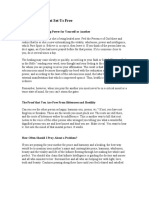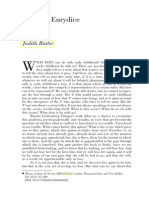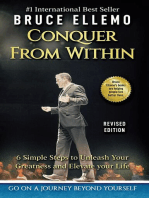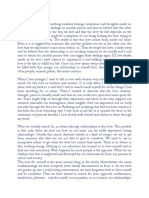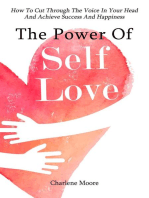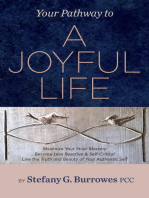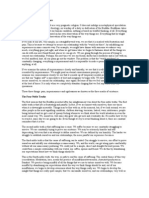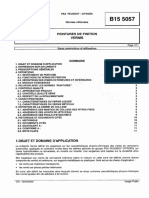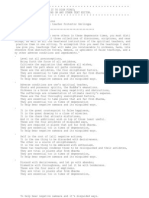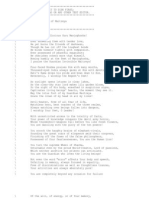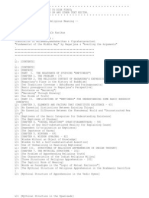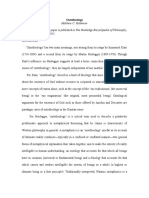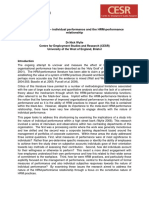Beyond The Self Position
Beyond The Self Position
Uploaded by
tantravidyaCopyright:
Available Formats
Beyond The Self Position
Beyond The Self Position
Uploaded by
tantravidyaOriginal Title
Copyright
Available Formats
Share this document
Did you find this document useful?
Is this content inappropriate?
Copyright:
Available Formats
Beyond The Self Position
Beyond The Self Position
Uploaded by
tantravidyaCopyright:
Available Formats
1
Beyond the Self Position
By Ajahn Sumedho
I think something that interests us all is ourselves - because we are the subject of our lives. No matter what you think of yourself, there is a natural interest there because you have to live with yourself for a lifetime. The self-view is therefore something that can give us a lot of misery, if we see ourselves in the wrong way. Even under the most fortunate circumstances, if we don't see ourselves in the right way we still end up creating suffering in our minds. So the Buddha was trying to point out that the way to solve the problem isn't through trying to make everything right and pleasant on the external dimension, but to develop the right understanding, the right attitude towards ourselves. This is the whole thrust of his teaching. Living in Britain at this time, we expect comfort and all kinds of privileges, rights and material comforts. This makes life more pleasant in many ways, but also when our every need is provided for and life is too comfortable, something in us doesn't develop. Sometimes it is the struggle through hardship that develops and matures us as human beings. I remember when we lived in London, we used to take walks up on Hampstead Heath in the morning and watch these well-off people taking their pet poodles for walks on the Heath. We'd start thinking that it wouldn't be so bad to be born as a lap dog here in England: have some nice lady constantly pampering you, making you little jumpers for the winter, and finding tasty little dog biscuits to feed you. It looked like a life of affection and comfort could be rather pleasing! But the truth is that most of us would find that suffocating: we need to measure ourselves against something, we need to struggle and to learn how to get beyond the limitations that we think we have at this time. Where we get defeated is where we give up to the limitations that we have through resignation and apathy. Then of course we just get depressed and miserable.
2 But when we give up or surrender to restriction and to restraint through wisdom, then we find liberation! Life is the experience of restriction and restraint, being born in the human body and having to live under the laws of nature on planet earth. Mentally we can soar up into the sky, we can go up into the heavens, but physically we are bound to limitations that get increasingly restrictive as we grow older. This need not be seen as suffering because that is the way things are. You can develop a different attitude and learn to accept the limitations - not out of a negative resignation but just because you realize that what you really are looking for is within you. You need not seek for it outside, you need not think that it is something far away or inaccessible to you. It comes through the willingness to calm down and stop resisting and to listen and awaken to your own conscious experience. But of course the big obstruction to that is that we have the sense of ourselves as being this or that or the other. The sense of oneself is something that we become conscious of when we are children; when we are born there is no sense of a self as being anything. As we grow up then we learn what we are supposed to be, if we are good or bad, if we are loveable or not, if we are approved of or disapproved of. So we develop a sense of ourselves. We also often compare ourselves to others and have role models of what we should be when we grow up. I noticed from my own experience that the ego really started consolidating when I was sent off to school: I was thrown into those classrooms with all those strange children and then I started noticing who was the strongest, who was the toughest, who was the one the teacher liked the best. We saw ourselves in terms of our relationships to others. This develops through a lifetime unless we deliberately choose to change and start looking more deeply than just living our lives through the conditioning of the
3 mind that we acquired when we were very young. Even when we get older, sometimes we still have very adolescent attitudes or childish emotional reactions to life that we have been unable to resolve except by suppressing or ignoring them. And these can be very embarrassing or shocking to us. There is one way of talking about the self that makes it sound very doctrinal. Buddhists can sometimes say that there is no self, as if it was a proclamation that you have to believe in; as if there were some God on high saying "THERE'S NO SELF!"; and in that presentation something in us resists. It doesn't seem true to just go announcing that there isn't any selfbecause what is this experience that we are feeling right now? Here there seems to be very much a sense of oneself! You're feeling, you're breathing, you see and hear; you react to things - people can praise you or criticize you and you feel happy or depressed accordingly. So if this isn't me then what is it? And am I supposed to go round as a Buddhist believing that I don't have a self? Or if I am going to believe in something, maybe it is better to believe that I do have a self, because then you can say things like: "my true self is perfect and pure." That at least gives you some kind of inspirational encouragement to try to live your life, rather than saying that there is no self, no soul, leaving a total annihilation of any possibilities. These are just examples of the use of language; we can say 'there is no self' as a proclamation, or "there is no self" as a reflection. The reflective mode is to encourage us to contemplate the self. The Buddha was pointing to the fact that when we really look at these changing conditions that we tend to identify with, we can begin to see that these are not self. What we believe in, what we hold to and cling to and assume, is not what we really are: it's a position, it is a condition, it is something that changes according to time and place. Each one of us is experiencing
4 consciousness through the human body that we have, and it is like this. Consciousness is a natural function; there is no sense of self in regards to consciousness. The only reason that we might assume a self is because consciousness operates in terms of subject and object; to be conscious we have to be a separate entity, so therefore we are operating from this position of being this subjective being here. Then we can get obsessed with a very personal interpretation of everything: every reaction or experience, whether it is instinctive or whatever, can be interpreted in the sense of it being me and mine. We can interpret the natural energies of the body in a very personal way as if this is me, my problem, rather than seeing them as part of the package that we get from being born as a human being. Even a baby when it is first born has instinctive drives to survive, so when it is hungry it cries. Babies are usually born beautiful creatures so that we naturally want to love and take care of them. Do you think that the baby is doing this deliberately - "I'm trying to be cute so that Ajahn Sumedho will hold me, my mother will love me - or is this just the way it is, just nature in operation? These are just natural things, but we tend to see them in very personal ways. We hold views about each other that we carry with us for a lifetime: she is like this, he is like that; and these influence how we react and we respond to each other - just in the way someone looks: pleasing, happy, welcoming; mean and unpleasant; or somebody praises us or insults us. We can carry resentment about being insulted for a lifetime and never forgive that person. Maybe they did it when they were just having a bad time, even after thirty years, we can still make a problem about it if we want. So this self needs to be examined and looked at and contemplated, in religious terms. Every religion has its self-naughting teachings: in some ways religion is about relinquishing the
5 selfish tendencies of the mind, so before we can, say, realize the Kingdom of God we have to let go of our selfish fascinations and obsessions. Or, if we are going to realize the true Dhamma, we need to let go of the self view. So this can be another command from above, like "You shouldn't be selfish! Get rid of any selfishness and try to become somebody who is pure!" We would all agree with that, nobody here would relish the idea of becoming more and more selfish, but sometimes we don't know how not to be selfish. We may have grand ideas that we should give up all our wealth, not hold on to anything; then we're getting closer to not being selfish - but the strange thing is that when you become a monk or a nun, sometimes, although you are thinking you are getting rid of selfishness, you find yourself getting more and more selfish. Your selfishness becomes very concentrated, because you can't spread yourself over such a wide area as in lay life. So you become much more aware of it. And if you condemn it, then it seems to be a hopeless situation, because you begin to interpret life from that sense of "I'm selfish and I've got to get rid of this selfishness." And one of the biggest problems in our way of thinking is to relinquish that basic premise that "I am this person and I have got to do something, in order to become an unselfish, enlightened person in the future." We are conditioned to think this way in our culture: be a good boy and therefore you do this and you do that and in the future you will become somebody who will be worthy and acceptable in society. This makes sense on the worldly side of life, because we start out illiterate, so we have to learn, and from then on we have to study all the different subjects in a school in order to become someone who can get through the system. If we fail then we become someone who fails. And failure is despised. It is interesting in teaching meditation to people who have this fear of failure, they fear that they are going to fail in
6 meditation. But there is no way you could fail in meditation. It is not about failure, otherwise even meditation becomes just another way for us to prove ourselves. "I can't do it now. If I practice hard, I will become a good meditator and I will become enlightened, hopefully..." And then the doubt comes: "But I don't think I could ever get enlightened. Who is enlightened?" People like to check us all out to see if Ajahn Sumedho is enlightened or whether Ajahn Viradhammo is, or whether we have reached some kind of advanced level. Or are we just blokes who haven't quite made it? But there is a different way of looking and thinking which is the opposite of seeing ourselves in terms of being somebody who has to do something to become somebody who is better than he or she is right now. That is the worldly way of thinking. That's what people like to hear isn't it: "I had all kinds of problems and was a very miserable, unhappy man and then practicing meditation I saw the light and now I'm happy and fulfilled." From the worldly conditioned attitude, "I am this person, I am this personality, I am Ajahn Sumedho... I am all kinds of things... I should be and I shouldn't be." But the aim of Buddhist meditation is about changing one's attitude by using the reflective or intuitive function of the mind. When we go into the stillness of meditation, often times the sense of oneself will take us over, we'll be filled with all kinds of memories and ideas about ourselves. We sometimes wish that... "if I go and meditate then I'll go into stillness and I'll get out of this ugly scenario of myself." Sometimes the mind will suddenly just stop and we'll experience a kind of bliss, or a peace that we have either forgotten or never really noticed before. But the sense of oneself will still operate because of the force of habit. So we develop an attitude of listening to this self, not in terms of believing or disbelieving but in noticing what it really is that arises and
7 ceases. Whether we think of ourselves as the greatest or the worst doesn't matter, the condition itself comes and goes. Through letting go or 'self-naughting', not trying to get rid of it but allowing it to go, then we begin to experience the true nature of mind, which is bliss, silence. So there are moments in our lives when the self does stop functioning and we get in touch with the pure state of conscious experience. That is what we call bliss. But when we have those blissful experiences, immediately the desire to have them again takes over, and no matter how hard we try to have it again, as long as we're attached to the view of wanting bliss again, we will never get it. It doesn't work that way. Wanting it means that we have already made it impossible, so the attitude then is one of letting go of desire. Not trying to suppress desire, because that is another kind of desire: the desire to get rid of desire is still the same problem. So if we're trying to suppress or annihilate desire, it doesn't work. Nor does just following desire. But in this state of attentive awareness, we begin to see what is actually taking place, then we can let go of the causes of our suffering. We see how it actually is, and we have that intuitive wisdom to let go. So in this life as a human being from birth to death every moment is an opportunity for understanding in the right way. Success or failure suddenly doesn't mean anything because even if we fail, we learn from that. This doesn't mean that we don't try or put ourselves forth but that our aim is no longer to succeed but to understand things. It takes a long time to get underneath this selfview because it is an all-pervasive influence on our conscious experience. With meditation also, we bring attention to very ordinary things like the breath and the body, and so we learn how to bring our attention into the present moment, to sustain our attention.
8 (From a talk given by Ajahn Sumedho in Summer 1993)
You might also like
- Understanding the Heart: The Art of Living in HappinessFrom EverandUnderstanding the Heart: The Art of Living in HappinessRating: 5 out of 5 stars5/5 (5)
- Joseph Murphy Great Truths That Set Us Free NotesDocument4 pagesJoseph Murphy Great Truths That Set Us Free NotesNevillution100% (3)
- Chidon An Introduction To Madhyamika by Dzigar KongtrulDocument126 pagesChidon An Introduction To Madhyamika by Dzigar KongtrulBudNo ratings yet
- Alasdair Macintyre Tasks of PhilosophyDocument244 pagesAlasdair Macintyre Tasks of Philosophygugolina100% (1)
- J Butler - Bracha's EurydiceDocument6 pagesJ Butler - Bracha's EurydiceDiego MadiasNo ratings yet
- 3 Keys To Happiness in LifeDocument7 pages3 Keys To Happiness in LifeMohammad Aasif Ikbal KaziNo ratings yet
- Break Free from Empathy Overload: Everything the Highly Sensitive Person Needs to Know to ThriveFrom EverandBreak Free from Empathy Overload: Everything the Highly Sensitive Person Needs to Know to ThriveRating: 4 out of 5 stars4/5 (2)
- Conquer From Within - 6 Easy Steps To Unleash you Greatness and Elevate Your LifeFrom EverandConquer From Within - 6 Easy Steps To Unleash you Greatness and Elevate Your LifeNo ratings yet
- Enriched Heart: The Tao of Balancing Your Big, Beautiful, Badass SoulFrom EverandEnriched Heart: The Tao of Balancing Your Big, Beautiful, Badass SoulNo ratings yet
- Let True Emotions Happen Rather Erroneously: Conditioned FeelingsFrom EverandLet True Emotions Happen Rather Erroneously: Conditioned FeelingsNo ratings yet
- You Can Heal Your LifeDocument11 pagesYou Can Heal Your LifePrateek JhanjiNo ratings yet
- It_s Time ... to do inner work: and watch your outer world changeFrom EverandIt_s Time ... to do inner work: and watch your outer world changeNo ratings yet
- Self Is Heavy, by Buddhadasa Bhikkhu: If We Understand Our ProblemsDocument3 pagesSelf Is Heavy, by Buddhadasa Bhikkhu: If We Understand Our ProblemsSoham CRNo ratings yet
- Scrip On YoutubeDocument4 pagesScrip On Youtubeandiephyhp0.0No ratings yet
- From Narcissism to Nirvana: Becoming a Healthy Leader Through Spiritual AwarenessFrom EverandFrom Narcissism to Nirvana: Becoming a Healthy Leader Through Spiritual AwarenessNo ratings yet
- Living in Light, Love & Truth: Change Your Life PositivelyFrom EverandLiving in Light, Love & Truth: Change Your Life PositivelyNo ratings yet
- Lifetime: Hat Is LifeDocument4 pagesLifetime: Hat Is LifeMarco Antonio Meza-FloresNo ratings yet
- How To Learn To Let Go of What You CanDocument5 pagesHow To Learn To Let Go of What You CanSarinah Urip100% (4)
- Epiphanies Within: When Mediocre Living Is No Longer EnoughFrom EverandEpiphanies Within: When Mediocre Living Is No Longer EnoughNo ratings yet
- LoveDocument4 pagesLoveMariaDucuNo ratings yet
- Do You Want To Be Normal or Happy - Robert Betz - Book SummaryDocument10 pagesDo You Want To Be Normal or Happy - Robert Betz - Book SummaryCambiador de MundoNo ratings yet
- The Power of Acceptance: End the Eternal search for happiness by accepting what isFrom EverandThe Power of Acceptance: End the Eternal search for happiness by accepting what isRating: 3 out of 5 stars3/5 (3)
- How To Align Your Emotions With LogicDocument39 pagesHow To Align Your Emotions With LogicAlexandra Elena Manea100% (2)
- Be YourselfDocument264 pagesBe YourselfTural100% (2)
- As You Are (Pure Land)Document3 pagesAs You Are (Pure Land)Julia PandreaNo ratings yet
- Real Answers: Fulfillment Is Closer Than You Think When You Know Where to Look.From EverandReal Answers: Fulfillment Is Closer Than You Think When You Know Where to Look.No ratings yet
- The Book of Healing Affirmations: Words to Improve Your Life; One Day at a TimeFrom EverandThe Book of Healing Affirmations: Words to Improve Your Life; One Day at a TimeNo ratings yet
- The Power Of Self-Love: How To Cut Through The Voice In Your Head And Achieve Success And HappinessFrom EverandThe Power Of Self-Love: How To Cut Through The Voice In Your Head And Achieve Success And HappinessNo ratings yet
- You Are Not What You Think: The Egoless Path to Self-Esteem and Generous LoveFrom EverandYou Are Not What You Think: The Egoless Path to Self-Esteem and Generous LoveRating: 3 out of 5 stars3/5 (4)
- Find Your Missing Peace: A Practical Guide to Reclaiming Your BirthrightFrom EverandFind Your Missing Peace: A Practical Guide to Reclaiming Your BirthrightNo ratings yet
- Steve Jobs: How To Live Your Best Life: Discover The Life Philosophy He Used To Guide His DecisionsFrom EverandSteve Jobs: How To Live Your Best Life: Discover The Life Philosophy He Used To Guide His DecisionsNo ratings yet
- I Promise MyselfDocument36 pagesI Promise Myselfyodaji60% (5)
- Living Life Unconsciously: A Guide to Waking up and Living Life with PurposeFrom EverandLiving Life Unconsciously: A Guide to Waking up and Living Life with PurposeNo ratings yet
- Ray Maor Self Development WorkbookDocument25 pagesRay Maor Self Development WorkbookGede Adél-JúliaNo ratings yet
- Building Healthy ThoughtsDocument32 pagesBuilding Healthy ThoughtsSehrishKhanNo ratings yet
- Introduction To BuddhismDocument4 pagesIntroduction To BuddhismzacgomezNo ratings yet
- From Vulnerable to Invincible: Achieve, succeed and live a more fulfilling lifeFrom EverandFrom Vulnerable to Invincible: Achieve, succeed and live a more fulfilling lifeNo ratings yet
- B155057 orDocument11 pagesB155057 ortantravidyaNo ratings yet
- Nagarjuna VyavaharasiddhiDocument1 pageNagarjuna VyavaharasiddhitantravidyaNo ratings yet
- Tsong Khapa Praises of ManjushriDocument9 pagesTsong Khapa Praises of ManjushriAlexandros PefanisNo ratings yet
- Tsong Khapa Three PrincipalsDocument8 pagesTsong Khapa Three PrincipalsAlexandros PefanisNo ratings yet
- Tsong Khapa MigtsemaDocument1 pageTsong Khapa MigtsematantravidyaNo ratings yet
- B155055 orDocument10 pagesB155055 ortantravidyaNo ratings yet
- Serlingpa Leveling OutDocument2 pagesSerlingpa Leveling OuttantravidyaNo ratings yet
- Tsong Khapa Mountain of BlessingsDocument4 pagesTsong Khapa Mountain of BlessingstantravidyaNo ratings yet
- The Nature of ThingsDocument103 pagesThe Nature of ThingsAlexandros PefanisNo ratings yet
- Tsong Khapa Brahma DiademDocument6 pagesTsong Khapa Brahma DiademAlexandros PefanisNo ratings yet
- Nagarjuna Karikas StrengDocument154 pagesNagarjuna Karikas StrengAlexandros PefanisNo ratings yet
- Nagarjuna Twelve Gate TreatiseDocument100 pagesNagarjuna Twelve Gate Treatisekariku123100% (1)
- Nagarjuna Dharmadhatustotra CommentaryDocument91 pagesNagarjuna Dharmadhatustotra CommentarytantravidyaNo ratings yet
- Good LifeDocument13 pagesGood LifeEloisa Joy MoredoNo ratings yet
- A Great Marxian Party (May 1923)Document17 pagesA Great Marxian Party (May 1923)antoniojoseespNo ratings yet
- ConstitutionalismDocument30 pagesConstitutionalismshikai95No ratings yet
- Hypotheses of WisdomDocument16 pagesHypotheses of WisdomJustin BNo ratings yet
- Instant Download Divine Holiness and Divine Action Mark C. Murphy PDF All ChapterDocument64 pagesInstant Download Divine Holiness and Divine Action Mark C. Murphy PDF All Chapterdarardity100% (4)
- Seven Point LojongDocument5 pagesSeven Point LojongHun LyeNo ratings yet
- Walker 1958Document16 pagesWalker 1958RicardoAssariceNo ratings yet
- Prayers in Nichiren BuddhismDocument3 pagesPrayers in Nichiren BuddhismPatrícia Anzini100% (1)
- ANTAHKARANADocument4 pagesANTAHKARANAAnonymous wphSiUcdYH100% (1)
- Phase 2 The TrainerDocument20 pagesPhase 2 The Trainerakshita ramdasNo ratings yet
- Number 4 October 1993: ISSN 0007-0904Document11 pagesNumber 4 October 1993: ISSN 0007-0904jlgtNo ratings yet
- The Ballad of Songbird and The SnakesDocument4 pagesThe Ballad of Songbird and The Snakeskkvn.pascualNo ratings yet
- Raja Sir's Cracking IAS Mains Test Series 2019Document11 pagesRaja Sir's Cracking IAS Mains Test Series 2019Murugaraja Subbiah100% (1)
- Halteman-Ontotheology WebsiteDocument17 pagesHalteman-Ontotheology Websiteapi-313638165No ratings yet
- The Doomsday Argument: A Literature Review: Nick BostromDocument23 pagesThe Doomsday Argument: A Literature Review: Nick BostrompoinkerNo ratings yet
- Department of Education: Learning Activity Sheet in Practical Research 2Document10 pagesDepartment of Education: Learning Activity Sheet in Practical Research 2Darlene Mae VenturanzaNo ratings yet
- The Missing Link - Individual Performance and The HRM-performance RelationshipDocument5 pagesThe Missing Link - Individual Performance and The HRM-performance RelationshipMizanur Rahman PeashNo ratings yet
- Philo of Man CapSLET LC 4.1Document9 pagesPhilo of Man CapSLET LC 4.1Vhince PiscoNo ratings yet
- The Meaning of The Word UpanishadDocument1 pageThe Meaning of The Word UpanishadsandeepNo ratings yet
- Doer ExperiencerDocument35 pagesDoer ExperiencerSamir SharmaNo ratings yet
- Analyzing A Written Text: 1-Purpose/ContextDocument3 pagesAnalyzing A Written Text: 1-Purpose/ContextnohaNo ratings yet
- Position: PaperDocument22 pagesPosition: PaperJames Philip RelleveNo ratings yet
- The Emergent Aspect Dualism View of Quantum PhysicDocument17 pagesThe Emergent Aspect Dualism View of Quantum PhysicNor Jhon BruzonNo ratings yet
- Robin Blackburn, Marxism: Theory of Proletarian RevolutionDocument33 pagesRobin Blackburn, Marxism: Theory of Proletarian RevolutionCritical Reading100% (1)
- Kaufman-The Question of GodDocument29 pagesKaufman-The Question of Godkansas07No ratings yet
- Political Science Mains 2009 Paper I Vision IasDocument2 pagesPolitical Science Mains 2009 Paper I Vision IasRahul ShuklaNo ratings yet
- Filipino Nursing TheoristsDocument33 pagesFilipino Nursing TheoristsRonnie De Vera Uno0% (3)

